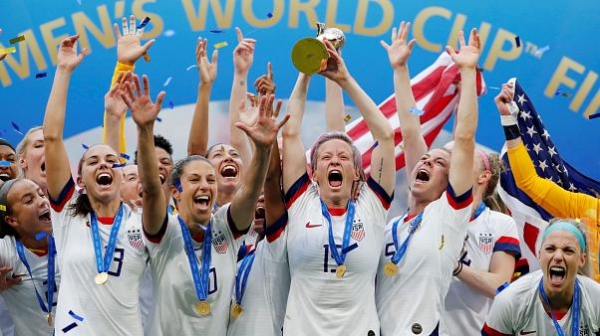
The US women's team, led by Rapinoe, celebrates winning the 2019 World Cup
– Copyright Reuters
Megan Rapinoe won the women’s Ballon d’Or on Monday, after her heroics helped the United States to World Cup glory in France this summer.
Having already picked up the FIFA Women’s World Player of the Year in September, the 34-year-old forward was the favourite to win only the second ever women’s Ballon d’Or.
The Reign FC forward scored six goals in the World Cup and earned both the Golden Boot as the top scorer and the Golden Ball as the tournament’s best player.
Rapinoe was not present at the ceremony to collect soccer’s most prestigious individual accolade, but in a recroded message said: “I’m so sad I can’t make it tonight. It’s absolutely incredible congrats to the other nominees. I can’t believe I’m the one winning in this field, it’s been an incredible year.”
She added: “I want to thank my team mates and the U.S. federation.”
Ada Hegerberg was the first woman to be awarded a Ballon d’Or, when she picked up the gong in 2018.
There was some controversy as the Lyon and Norway forward collected her award, when the host asked her on stage if she knew “how to twerk” — a comment perceived by many as sexist.
In the men’s category, Lionel Messi won a record sixth Ballon d’Or.
The 32-year-old, who lifted the coveted trophy in 2009, 2010, 2011, 2012 and 2015, beat Liverpool’s Champions League winner Virgil van Dijk in a vote of international journalists.
Messi won Spain’s Liga title with Barca this year and led Argentina to third place at the Copa America in July.
The Ballon d’Or has been awarded five times apiece to two footballing titans of their generation — Messi and Cristiano Ronaldo. The latter, while nominated for this year’s award, hasn’t had the same impact in 2019 as his Argentinian rival.
Messi, who last won the award in 2015, has already scored 11 goals and provided eight assists in just 14 games so far this season, while in the 18-19 season he scored a stunning 51 goals in 50 games.
Last year, Real Madrid’s Luka Modric won, marking the first time in 10 years that neither Messi nor Ronaldo were named the world’s best player. It also marked the recognition of a player whose primary purpose isn’t to score goals.
